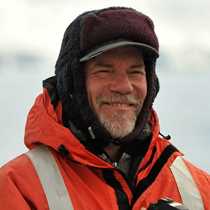Antarctic Peninsula
Diving the seas around the Antarctic Peninsula, using digital video cameras to record the astounding wealth and variety of marine creatures that make their home here, acting as the underwater eyes of a Lindblad Expedition, is a fantastic privilege. In making this a feature of our journeys to the white continent we are taking part, in a small way, in a great tradition of marine science and exploration. Diving biologists have been working to advance understanding of Antarctic marine ecology since the 1960’s, collectively logging thousands of dives and slowly piecing together a picture of how life proceeds in these sub-freezing waters. This work has uncovered an amazing array of startling adaptations to this extreme environment: fish with anti-freeze in their blood, sponges that use natural fiber optics to gather the light needed by the symbiotic algae that live inside their bodies, sea slugs that co-opt the toxic chemical defenses of their prey for their own protection and much, much more. It’s a weird, beautiful world in the seas under The Ice and the more we learn the stranger the story becomes.
The Antarctic is a very big place and many of the studies of its seas are necessarily limited in geographic scope by the constraints of logistics and safe travel. By contrast, as divers on board the Endeavour our greatest opportunity is our mobility and in the past five seasons, as our small vessel and her highly experienced officers and crew have pushed back the horizons of tourism in the region, we have been able to pioneer dozens of previously undived sites around the peninsula. In doing so we have learned a great deal from the work of pioneering Antarctic divers and the men and women who are carrying on their studies today, and we have been able to test their ideas in new locations and situations. We have been lucky enough to capture with our cameras behaviors and associations that may never have been previously observed and in a small way we hope to be adding to the knowledge of these cold seas and their remarkable inhabitants. It’s exciting and moving to have this opportunity and, again, it is a privilege. During this, the first trip of 2005, I logged my 100th dive south of the Antarctic Convergence, a milestone of some significance to me, and I would like to take this opportunity to offer my sincerest thanks to the officers, crew and staff of the Endeavour, to everyone in our offices and, most of all, to our guests who make it all possible.
Diving the seas around the Antarctic Peninsula, using digital video cameras to record the astounding wealth and variety of marine creatures that make their home here, acting as the underwater eyes of a Lindblad Expedition, is a fantastic privilege. In making this a feature of our journeys to the white continent we are taking part, in a small way, in a great tradition of marine science and exploration. Diving biologists have been working to advance understanding of Antarctic marine ecology since the 1960’s, collectively logging thousands of dives and slowly piecing together a picture of how life proceeds in these sub-freezing waters. This work has uncovered an amazing array of startling adaptations to this extreme environment: fish with anti-freeze in their blood, sponges that use natural fiber optics to gather the light needed by the symbiotic algae that live inside their bodies, sea slugs that co-opt the toxic chemical defenses of their prey for their own protection and much, much more. It’s a weird, beautiful world in the seas under The Ice and the more we learn the stranger the story becomes.
The Antarctic is a very big place and many of the studies of its seas are necessarily limited in geographic scope by the constraints of logistics and safe travel. By contrast, as divers on board the Endeavour our greatest opportunity is our mobility and in the past five seasons, as our small vessel and her highly experienced officers and crew have pushed back the horizons of tourism in the region, we have been able to pioneer dozens of previously undived sites around the peninsula. In doing so we have learned a great deal from the work of pioneering Antarctic divers and the men and women who are carrying on their studies today, and we have been able to test their ideas in new locations and situations. We have been lucky enough to capture with our cameras behaviors and associations that may never have been previously observed and in a small way we hope to be adding to the knowledge of these cold seas and their remarkable inhabitants. It’s exciting and moving to have this opportunity and, again, it is a privilege. During this, the first trip of 2005, I logged my 100th dive south of the Antarctic Convergence, a milestone of some significance to me, and I would like to take this opportunity to offer my sincerest thanks to the officers, crew and staff of the Endeavour, to everyone in our offices and, most of all, to our guests who make it all possible.




